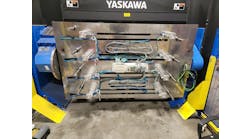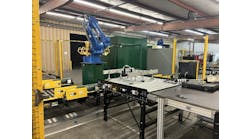Innovation Works (IW), a Pittsburgh-based investment company, along with the Pittsburgh Robotics Network and other regional partners, are launching the Robotics Factory, a set of inter-related programs that are part of the $63 million Build Back Better Regional Challenge grant the Southwestern Pennsylvania New Economy Collaborative received from the U.S. Economic Development Administration (EDA). The Robotics Factory will be designed to create, accelerate and scale robotics startups in the Pittsburgh region. To kick off the program, startup companies in robotics, robotics-adjacent sectors and other advanced technologies related to robotics can apply for the accelerate program starting February 1.
The regional EDA grant gives southwestern Pennsylvania the opportunity to further the regional robotics and autonomy. It is funding five regional projects – including the Robotics Factory – which together are designed to transform southwestern Pennsylvania by providing long-term opportunities for individuals, businesses and communities to become involved in this burgeoning sector, especially those who have been excluded from opportunities for employment, wealth creation and innovation generated by robotics and autonomy.
“Considered one of the next great ‘general purpose technologies,’ robotics and autonomy will increase economic productivity, spur job growth and integrate with other major, crosscutting business trends, such as digitalization, cloud computing and open-source software,” said Stefani Pashman, Allegheny Conference on Community Development CEO. “Given the Pittsburgh region’s assets and growing base of companies, robotics and autonomy are uniquely positioned with the infusion of Build Back Better Regional Challenge grant funding to serve as an engine for inclusive economic growth for the broader region.”
The Robotics Factory being led by IW to further develop a robotics ecosystem in the Pittsburgh region. With four-year support from the EDA, IW will match a portion of the $12 million provided by the EDA with additional operating and investment capital to provide seed funding to selected startups to help them grow.
Mike Formica, managing director of hardware for IW, explained that investing in manufacturing companies during their early development stages sets the stage for success to benefit end users in the long run.
“By considering manufacturing and scale during the initial design/deployment phase, companies are able to get to revenue faster which leads to more successful outcomes,” Formica says. “The question we ask companies is, ‘If you received an order for 1,000 of these devices tomorrow, could you deliver?’ We are doing this by offering design-for-manufacturing services as part of the Robotics Factory programs. Further, we will have an in-house production-grade prototyping facility. ‘Production-grade’ is a key phrase. 3D printing and other rapid techniques have a key role in early-stage development, but as volumes increase, manufacturing methods must change. When a product shifts from 3D printing to CNC machining to injection molding, the design itself must change. By prototyping in-house using higher volume techniques, companies are able to provide manufacturers with production-ready designs.”
“In addition to our in-house engineers and prototype shop, we have a close relationship with many of the region’s thousands of manufacturers,” he continued. “We encourage and even incentivize our companies to engage those manufacturers early in their process. Local supply chains result in quicker turnaround times, more active engagement and ultimately accelerate time to market.”
- The Robotics Factory Create program is designed to drive innovation to meet industry demands by bringing entrepreneurs, technology experts and researchers together with industry experts to define existing and emerging problems and identify solutions together. IW and the Pittsburgh Robotics Network will convene and facilitate multiple workshops per year, each workshop focused on one specific industry/customer segment (ex. agriculture, construction, aviation, etc.). A number of entrepreneurs, technology experts and researchers from southwestern Pennsylvania will be selected to meet with industry leaders to understand their pain points and collaborate on developing innovative solutions to these problems/defined needs.
- The Robotics Factory Accelerate program is an opportunity for up to six pre-seed robotics startups to receive as much as $100,000 in funding from IW, mentorship and resources to take their company to the next stage of growth. The Robotics Factory accelerator is an intensive, seven-month program, during which companies will move into the Robotics Factory’s co-working space, have access to manufacturing and robotics resources including a production-grade prototype shop and robot lab, and receive coaching and support tailored to their specific business needs. The participants will also have access to mentorship opportunities with other Pittsburgh-based robotics companies and national and global industrial partners via the Pittsburgh Robotics Network.
- The Robotics Factory Scale program provides expertise in product prototypes and services to help startups develop production-ready products. The program provides in-house design for manufacturing, supply chain management, prototyping assistance and access to the region’s manufacturing resources. The Robotics Factory includes a production-grade prototype shop with in-house staff to support product development and low-rate production, as well as focusing on the production of complex physical products. By considering manufacturing during the early design stages, companies can grow, deploy their technologies and achieve scale more quickly.
“The Robotics Factory will further the region’s efforts to grow robotics startups and link them to industry and manufacturing capabilities,” said Ven Raju, president & CEO of IW. “What captured the attention of the EDA and made the Southwestern Pennsylvania application stand out for the competitive Build Back Better grant was the region’s cohesive approach to building and leveraging the workforce and capabilities of robotics industries.” Speaking about the IW-led initiative that is part of the greater Build Back Better Regional Challenge, Ven continued, “Not only will the Robotics Factory programs address existing problems experienced by industries that can be solved using robotics and automation solutions, we plan to also provide the resources and funding that are so critical to emerging companies. Together, the Robotics Factory Create, Accelerate and Scale programs will be dynamic additions to one of the region’s most important economic engines.”
IW’s Formica added: “The skilled team and specific capabilities of the Robotics Factory programs will make meaningful connections that benefit both emerging startups and the thousands of manufacturers in the region. By starting and growing companies that build their products locally, we provide opportunities for broader regional job growth.”
The Pittsburgh Robotics Network, a nonprofit organization focused on developing business opportunities for the local robotics industry, will assist IW in marketing the programs of the Robotics Factory. Joel Reed, president & CEO of the Pittsburgh Robotics Network said: “Pittsburgh is a world leader in robotics and automation, and the Robotics Factory helps take this to the next level by providing the mentorship, resources and connections needed to take new innovative concepts from the idea stage to a commercial solution that can be deployed at scale. The Robotics Factory provides an opportunity for aspiring entrepreneurs to learn how to develop successful solutions to pressing industry challenges.”





